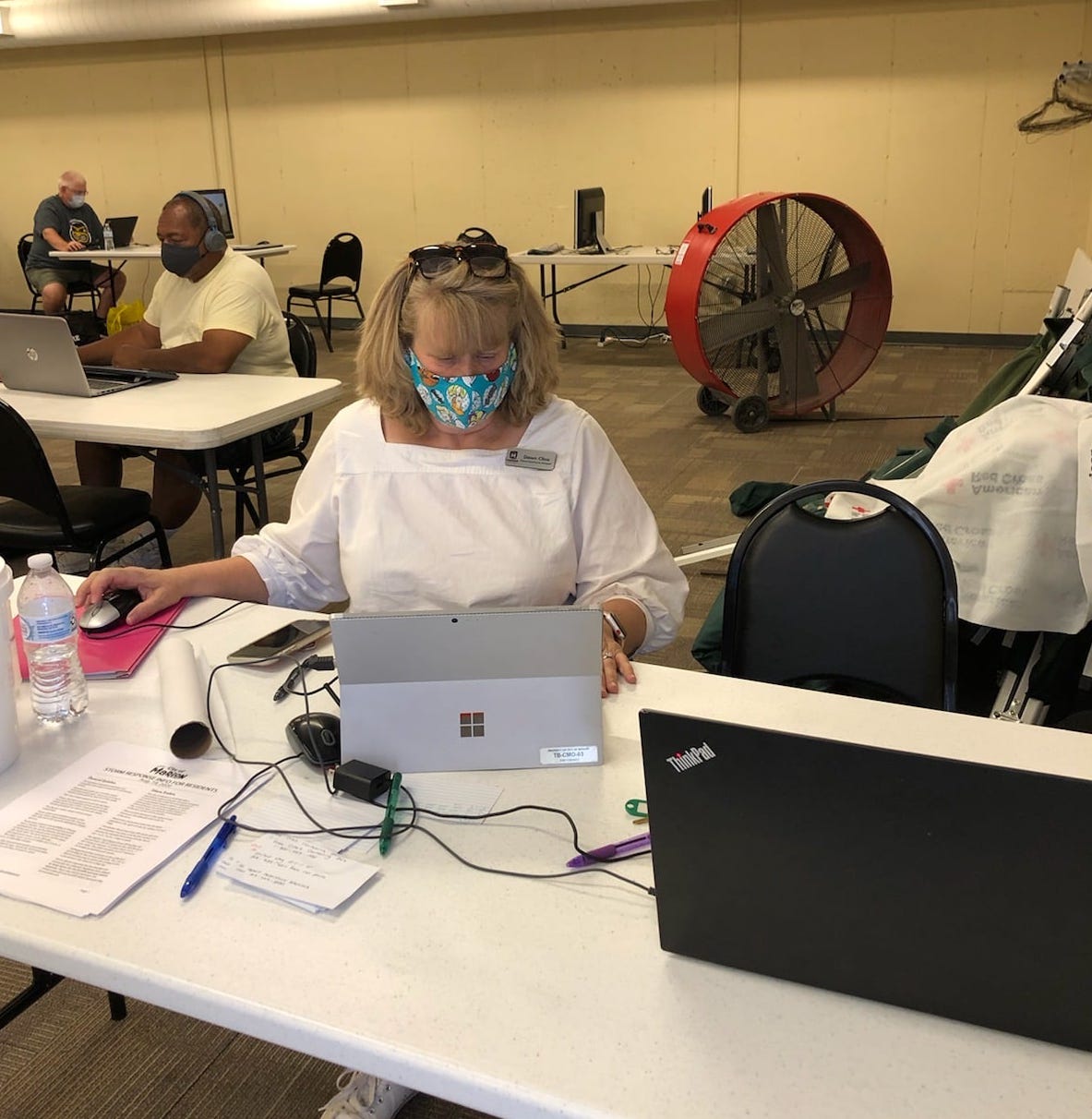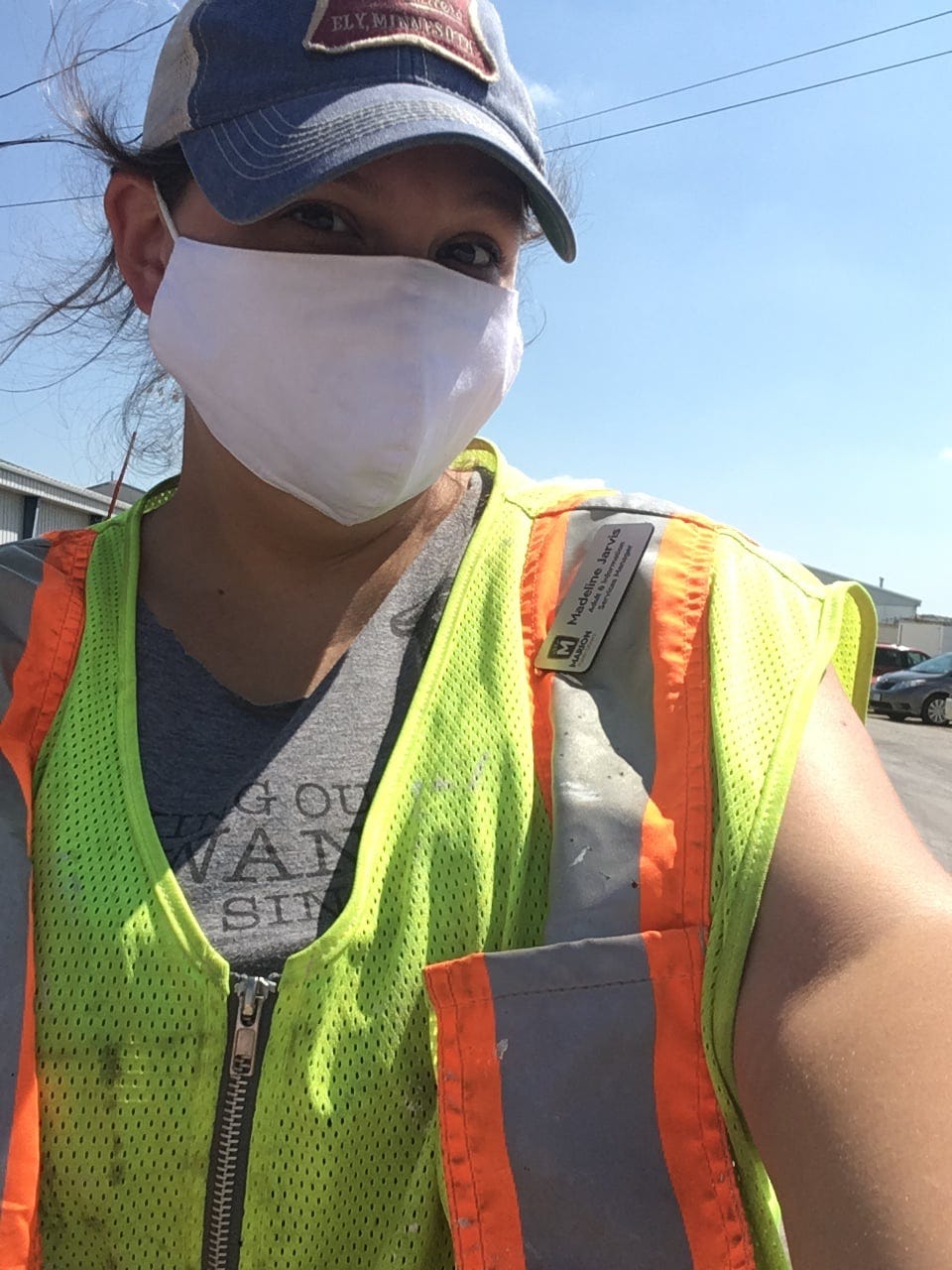Notebook: Librarians to the Rescue
After the 2020 derecho tore through eastern Iowa, leaving hundreds of thousands without power and many displaced when their homes were damaged or destroyed in the heavy winds, the Marion Public Library, whose building was completely destroyed, set up temporary facilities offering public wifi and technology stations, pickup for what of its collection they were able to salvage, and socially-distanced outdoor programming for families. They passed out navigational guides updated daily and printed at the local police station that included phone numbers to call, the developing cleanup timeline, information about food assistance, and public safety reminders. Photo by Marion Programming Manager Madeline Jarvis, with thanks to Veronda Pitchford, Califa Group.
Maybe it’s a good moment to look ahead, at where our salvation might be coming from.
In the spending bill the US Congress passed on December 22 and President Trump eventually signed on December 27, Congress, as it had each year of the Trump administration, increased support for the agency delivering funding to America’s public libraries, in spite of the President’s calls each year to eliminate it. As John Chrastka, speaking for the nation’s only library political action committee, told Publishers Weekly recently, “We know very clearly, in a downtime for municipalities, when there is stress on health, on well-being, on infrastructure, that libraries are going to be called upon more than ever. We saw in this in the last recession: people from all walks of life are going to come in off the street” to seek free information, to look for a job, to hunt for public benefits. As American Library Association Washington representative Kathi Kromer said, the crises bearing down on Americans as 2021 dawns have (to put it mildly) “a knowledge component.”
Chrastka and Kromer were joining Publishers Weekly senior editor Andrew Richard Albanese in a fascinating installment of PW’s “Live from the Library Lounge” webinar series: “The Election Is Over: What Does that Mean for American Libraries? (We admit we were drawn in from our lonely work-desk, perhaps, by the quasi-louche allure of “Live from the Library Lounge.”) They pointed out that although library funding may not on the face of it look essential in the way that, say, food relief and housing and education are, libraries tend to be an access point of first resort for vulnerable people, especially in times of crisis. If libraries seem always to wind up in the crosshairs in moments of fiscal austerity (Chrastka, wryly: Republicans seem to “find their inner deficit hawk when Democrats are in power”), they enjoy broad bipartisan support and repeatedly show up as one of the most trusted arms of government.
Chrastka described how mid-pandemic library funding is threatened not only by opponents in Washington but by fiscal crises at home: libraries supported by property taxes are, in 2021 (in contrast to 2008), relatively stable, but many are dependent on (plummeting) income tax revenue and revenues derived from embattled local industries like hotels, energy, and casinos, on lotteries, and on grants from overwhelmed philanthropies. Until local tax revenue can recover from the current economic plunge libraries will need “community stabilization” funds to municipalities from Washington as well as direct federal funding to continue to provide their vital services, especially for those with few other resources. Libraries also need advocates throughout government working to channel available funds for services (like public wifi, more on that below) to the libraries that can provide them.
Subscribe to Book Post
Supporting writers and the reading life
The Library Lounge next brought to the mic Veronda Pitchford of a California library consortium called Califa to talk about a project they are working on to provide libraries with “Second Responder” packages for communities in crisis. Pitchford explained that after first responders like firemen and EMTs have arrived at a disaster to address immediate needs, “second responders,” like social workers and public health officials, assess “what are the harms” and “what are the available resources” to address them. During the confusion of the first months of the covid epidemic librarians were often thrown onto the frontlines with limited instructions or even medical protection. In a list of 2020’s main library stories, Albanese offered as #2 the moment when library workers “took a stand” in April and May, calling for safe working conditions and reasonable expectations in the face of heroic narratives summoning them to sacrifice themselves at the circulation desk. (We wrote about this in May). Albanese referenced a 2018 article by library scholar Fobazi Ettarh coining the term “vocational awe” to describe a moral elevation of certain professions that can seem like window dressing for unreasonable expectations of their practitioners. Publishers Weekly also recognized the front-line work of librarians alongside bookstore and publishing-house workers in a collective “Person of the Year” designation for 2020. Pitchford described how library workers were themselves affected by disease and exposure among their families and communities. She described the early pandemic as “the scariest time in my lifetime.” We need, she said, to focus on putting “systems in place that focus on budget, living wage, making people whole” for those who serve us as librarians do. Chrastka’s group, EveryLibrary, is calling on the CDC to recognize librarians alongside teachers as frontline workers in vaccine priority.
In creating infrastructure to meet challenges like the pandemic, Pitchford described how the role of the second responder is “not just the transactional.” Library workers acting as second responders address “what the whole person needs” and how libraries can “plug into the network of organizations in their communities working to serve vulnerable, covid-impacted folks.” “People come to us not only with their information needs but their life needs,” she said. Libraries, she went on, are uniquely situated to address the “rifts in America, distrust of science, knowledge,” to use the faith that Americans have in their libraries “to support communities coming together.” As libraries are charged with serving everybody, they are a real-time laboratory of institutional commitment to inclusion.
December’s spending bill rewarded librarians’ advocacy in funding their agency, the IMLS, but disappointed them with the emergency provisions of the relief bill within it. President-elect Biden yesterday announced a much more expansive spending package, including the support for states and municipalities signally lacking in the December bill. A relief proposal released by Senate Democrats at the end of December as a template for an actual (as opposed to emergency) stimulus bill, called The Economic Justice Act, includes $5 billion for library construction among its infrastructure projects. (See EveryLibrary’s analysis here.)
As Kromer and Chrastka discussed, expanding access to broadband and connectivity has become central to libraries’ mission. Chrastka said the the story of kids doing their remote schoolwork in library parking lots “is a local hero story but also a national tragedy,” a tragedy magnified by the number of students beyond the parking lot whom wifi does not reach at all. The three called for a national broadband strategy that would address emergent needs not only for student access to wifi but also for telehealth, small business connectivity, and other yawning virtual information gaps exposed by the pandemic. Libraries, including school and tribal libraries, are already in place to provide such services and could be central nodes in a comprehensive national system. Chrastka emphasized that the needs of such a policy are more than technical: “that thing we’ve been missing the most in our Zoom meetings: It’s a little impersonal. How do we use this new technology, how do we use a robust broadband policy, to build community anew? We have been isolated in so many different ways, I’d like to see us as a libraries lean in from not just a technology perspective but programmatically as well.”
As Eric Klinenberg, whose work on libraries and bookstores and other “social infrastructure” we’ve returned to again and again, told Publishers Weekly last May: “The shutting down of cities and public spaces has generated incredible challenges, including an economic recession and a social recession. We now have millions of people who are feeling isolated, and stressed, and out of sorts. This is a moment in our history where we are going to need public spaces like never before. I think this pandemic has magnified the importance of the public library in American community life. There simply is no other place that has such capacity to bring people together.” He fears for the fate of libraries in an environment where distrust of government is an ideological weapon. “Let’s be clear,” Klinenberg says. “When you hear there is a debate in Congress about whether to ‘bail out’ states and cities, that is a debate about whether your local library stays open, or closes.”
Read more about libraries in Book Post:
Jorge Carrion on the world’s most important (if unexpected) libraries
Sue Halpern and Her Town Build a Library
Ruth Franklin on Susan Orlean’s The Library Book
Book notes: Libraries and the pandemic
Book notes: Libraries as vital public space
Book notes: The life & death of library programs
Book thoughts in the age of shutdown
Book Post is a by-subscription book review service, bringing book reviews by distinguished and engaging writers direct to your in-box, as well as free posts like this from time to time to those who follow us. Subscribe to our book reviews and support our writers and our effort to grow a common reading culture across a fractured media landscape. Coming soon: Wyatt Mason on William Vollmann, Robert Gipe on Soul Full of Coal Dust.
Malaprop’s Bookstore/Cafe, in Asheville, North Carolina, is Book Post’s Winter 2020 partner bookstore! We support independent bookselling by linking to independent bookstores and bringing you news of local book life as it happens in their aisles. We’ll send a free three-month subscription to any reader who spends more than $100 there during our partnership. Send your receipt to info@bookpostusa.com.
Follow us: Facebook, Twitter, Instagram
If you liked this piece, please share and help us to grow, and tell the author with a “like”




